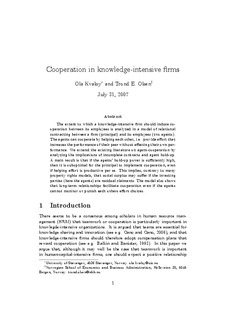| dc.contributor.author | Kvaløy, Ola | |
| dc.contributor.author | Olsen, Trond E. | |
| dc.date.accessioned | 2008-01-14T11:57:40Z | |
| dc.date.available | 2008-01-14T11:57:40Z | |
| dc.date.issued | 2007-07 | |
| dc.identifier.issn | 1500-4066 | |
| dc.identifier.uri | http://hdl.handle.net/11250/163905 | |
| dc.description.abstract | The extent to which a knowledge-intensive firm should induce cooperation between its employees is analyzed in a model of relational contracting between a firm (principal) and its employees (two agents). The agents can cooperate by helping each other, i.e. provide effort that increases the performance of their peer without affecting their own performance. We extend the existing literature on agent-cooperation by analyzing the implications of incomplete contracts and agent hold-up. A main result is that if the agents' hold-up power is sufficiently high, then it is suboptimal for the principal to implement cooperation, even if helping effort is productive per se. This implies, contrary to many property rights models, that social surplus may suffer if the investing parties (here the agents) are residual claimants. The model also shows that long-term relationships facilitate cooperation even if the agents cannot monitor or punish each others effort choices. | en |
| dc.language.iso | eng | en |
| dc.publisher | Norwegian School of Economics and Business Administration. Department of Finance and Management Science | en |
| dc.relation.ispartofseries | Discussion paper | en |
| dc.relation.ispartofseries | 2007:27 | en |
| dc.title | Cooperation in knowledge-intensive firms | en |
| dc.type | Working paper | en |
| dc.subject.nsi | VDP::Samfunnsvitenskap: 200::Økonomi: 210::Bedriftsøkonomi: 213 | en |
